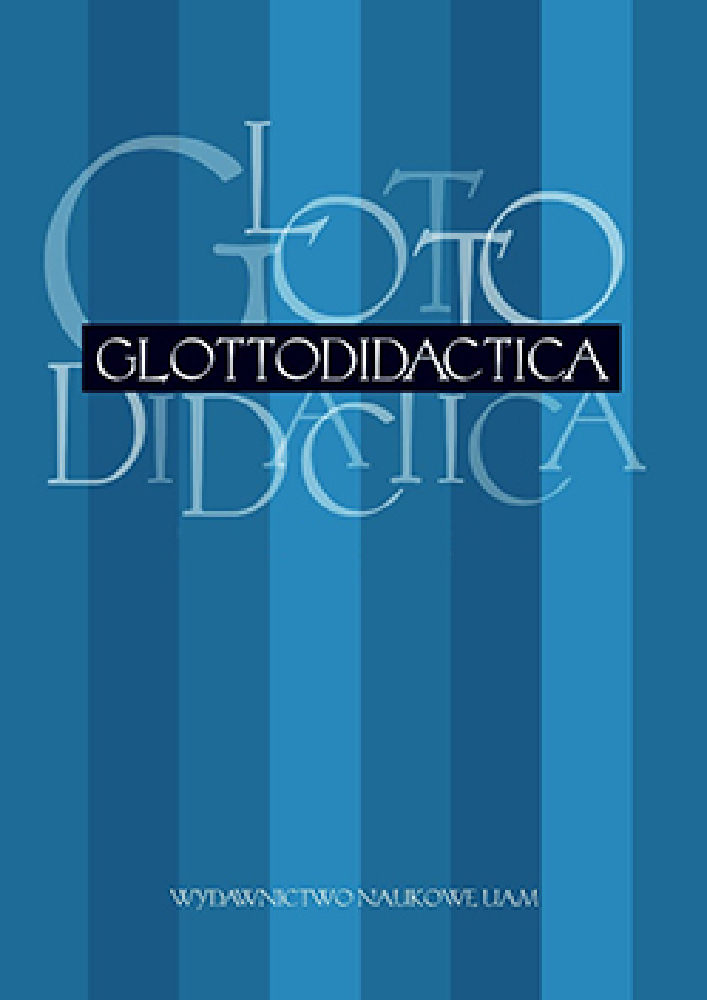Abstract
Learning a specialist language entails developing a number of linguistic competencies, the most important of which is discursive competence enabling proper communication in a particular professional environment. Its development requires that the learner should become sensitive to the pragmatic aspects of specialist language use in a wider discursive context, with particular attention to genre norms forming a discursive polisystem of a given culture. This paper presents specialist text translation as one of the most effective ways of teaching a specialist language by improving discursive competence.
References
Bergeron, J., Desmarais, L., Duquette, L., 1984. « Les exercices communicatifs : un nouveau regard ». Etudes de linguistique appliquée. Vol. 37.
Charaudeau, P., 1995. Une analyse sémiolinguistique du discours. In: Langages. Vol. 29, no 117, 96-111.
Charaudeau, P., Maingueneau, D., 2002. Dictionnaire d’analyse du discours. Paris : Seuil.
Charnock, R., 1999. Les langues de spécialité et le langage technique: considérations didactiques. In: ASp [En ligne] 23-26 (http://asp.revues.org/2566, consulté le 10.06.2012).
Conseil de l’Europe, 2001. Cadre européen commun de référence pour les langues – apprendre, enseigner, évaluer. Paris : Editions Didier.
Dechamps, C., 2004. « Enseignement/apprentissage des collocations d’une langue de spécialité à un public allophone: l’exemple de la langue juridique ». Ela. Études de linguistique appliquée 3, 361-370.
Deyrich, M.-C., 2004. Exploration didactique de la langue du milieu professionnel à l’université: quel apport pour la définition de tâches d’enseignement-apprentissage ? ASp [En ligne] 43-44, (http://asp.revues.org/1106, onsulté le 10.06.2012).
Grucza, S., 2004. Od lingwistyki tekstu do lingwistyki tekstu specjalistycznego. Warszawa: Zakład Graficzny Uniwersytetu Warszawskiego.
Gutt, E.-A., 2004. Dystans kulturowy a przekład. Kraków: Universitas.
Isani, S., 2004. Compétence de culture professionnelle: définition, degrés et didactisation. ASp, 43-44 (http://asp.revues.org/979, consulté le 10.09.2011).
Keyong, L., Vandevelde, D., 2008. Langue(s) de spécialité(s): mythe ou réalité ? Lexicographie et ‘langue(s) de spécialité(s). Synergies Chine 3, 31-40.
Lerat, P., 1997. Approches linguistiques des langues spécialisées. In: ASp [En ligne] 15-18, (http://asp.revues.org/2926, consulté le 16.06.2012).
Moirand, S., 1982. Enseigner à communiquer en langue étrangère. Paris : Hachette.
Pytel, W.A., 2003. Identyfikatory semantyczne tekstów specjalistycznych. In: Kielar, B.Z., Grucza, S. (éds). Języki specjalistyczne 3. Lingwistyczna identyfikacja tekstów specjalistycznych. Warszawa: Zakład Graficzny Uniwersytetu Warszawskiego, 59-73.
Resche, C., 1999. De l’utilité d’une approche syntaxique en langue spécialisée: exemple de l’anglais économique. In: ASp [En ligne] 23-26 (http://asp.revues.org/2356, consulté le16.06.2012).
Troszczyńska-Nakonieczna, W., 2003. Pragmatyczne aspekty badań gatunków specjalistycznych na potrzeby tłumaczeń i dydaktyki. In: Mamet, P., Mrózek, A. (éds). Języki specjalistyczne. Zagadnienia dydaktyki i przekładu. Katowice: Śląsk, 247-260.
Walkiewicz, B., 2010. Entre la sémantique et la pragmatique ou de la traduction des textes de spécialité. In: Dutka-Mańkowska, A., Giermak-Zielińska, T. (éds), Des mots aux conceptions de la description linguistique. Warszawa: Wydawnictwa Uniwersytetu Warszawskiego, 441-448.
Walkiewicz, B., 2011. Między formą a normą, czyli o identyfikacji dyskursywnej w tłumaczeniu tekstów specjalistycznych. In: Kasperska, I., Żuchelkowska, A. (éds). Przekład jako produkt i kontekst jego odbioru. Poznań: Wydawnictwo Rys, 153-172.
Walkiewicz, B., 2012a. Interdyskursywność w przekładzie tekstów specjalistycznych. In: Rocznik Przekładoznawczy, 6, 99-115.
Walkiewicz, B., 2012b (sous presse). Entre texte et image ou de la traduction des projets d’architecture.
Walkiewicz, B., 2012c (sous presse). Traduction en tant que discours.
License
Authors
Authors of texts accepted for publication in Glottodidactica are required to complete, sign and return to the Editorial team’s office the Agreement for granting a royalty-free license to works with a commitment to grant a CC sub-license.
Under the agreement, the authors of the texts published in Glottodidactica grant Adam Mickiewicz University in Poznań a non-exclusive, royalty-free license and authorize the use of Attribution-NoDerivatives 4.0 International (CC BY-ND 4.0) Creative Commons sub-license.
The authors retain the right to the free disposal of the work.
Users
Interested Internet users are entitled to use works that have been published in Glottodidactica since 2016, under the following conditions:
▪ attribution – obligation to provide, together with the distributed work, information about the authorship, title, source (link to the original work, DOI) and the license itself.
▪ no derivatives – the work must be preserved in its original form. Without the author's consent, it is not possible to distribute the modified work in the form of translations, publications, etc.
Copyrights are reserved for all texts published before 2016.
Miscellaneous
Adam Mickiewicz University in Poznań retains the property right as a whole (layout, graphic form, title, cover design, logo etc.).
Privacy statement
The names and email addresses published on this journal site will be used exclusively for the purposes declared by this journal and cannot be used for any other purpose or by any other party.




